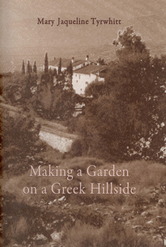
Mary Jaqueline Tyrwhitt
Making a Garden
on a
Greek Hillside
The hillsides of Attica are stony and arid. Over-grazed in the past by goats and sheep, they have few trees and are covered in dense, prickly scrub. Relentless sun and often strong winds prevail for five months of the year, but in the autumn and spring months the miracle of the extraordinary variety and beauty of the Greek flora is revealed to the discerning eye.
It was on such a hillside that the English woman Jaqueline Tyrwhitt — Harvard University professor, town planner of international renown and amateur botanist — chose to make a garden. This book is the story of the making of that garden and a distillation of what she learnt and observed about the plants that grew there, a book which she wrote (to use her own words) 'to assist other people wishing to make gardens in places with a "Mediterranean climate", believing that anything that grew under the difficult conditions prevailing on this Greek hillside would be almost certain to grow better elsewhere.'
The garden that she created was different from most other Greek gardens at that time, in the 70s and 80s, for in addition to cultivated garden plants she wanted to include in it, and to sustain, encourage and introduce in the surrounding hillside, as much native Greek flora as she could. This book describes month by month the plants that grew, thrived or merely survived there, and her vivid descriptions of those plants reveal a great sensitivity to the delicate beauty of the natural world combined with a plantswoman's integrity. With an equally sensitive and observant eye she also describes the events and activities — the agricultural life, the feasts and festivals — of her neighbours and the nearby village.
'This is a long awaited book. It is the remarkable garden diary of a talented and energetic intellectual . . . whose love of plants and their cultivation will strike a chord with all gardeners. . . . At the forefront of ecologically responsible thinking, she was acutely aware of the possible damage to the delicate balance between flora and fauna which could result from the introduction of non-native planting around archaeological sites or in areas of reafforestation. . . . Each chapter brings more delights, and the descriptions are evocative and practical, not only of day-to-day experiences but also of the plants themselves. . . . It will become an essential tool for those anywhere in the world where water is scare and native plants are threatened.' Penelope Hobhouse in Gardens Illustrated.
'Jacky Tyrwhitt's book is much more than another whimsical account of Mediterranean country life. It probes beneath the surface of the idyll to present an unpretentious, practical view of gardening in Greece. Its relevance, however, extends far beyond Greece and the Aegean. Horticulture is a growth industry in the Mediterranean region, as standards of living rise, leisure time expands and more overseas visitors settle there. Garden centres are springing up from Andalucia to Anatolia, although they tend to promote garish and exotic container plants rather than sample the region's rich native flora. This book provides a wealth of ideas for growing and mixing plants, native and introduced, in a Mediterranean garden. It does not impose an outsider's view so much as to build upon an existing cottage garden tradition . . . Here too is a blueprint for wildlife gardening, and plant species and genetic conservation, in the south. . . . This lovely book deserves to become a minor classic amongst gardeners (and hellenophiles) everywhere.' John Akeroyd in The New Plantsman.
This second revised edition, in which the nomenclature of the plants described has been updated, includes many more illustrations and a long review of the development of the garden at Sparoza since Jacky Tyrwhitt's death in 1983.
- 280 pages, 24.0 x 17.0 cm, over 150 line drawings, 2018
The home and garden of Jacky Tyrwhitt are now the headquarters of the Mediterranean Garden Society which was founded in 1995. The royalties from the sales of this book are donated to the Society.
For more information about the Society and its activities, visit www.MediterraneanGardenSociety.org, or write to The Mediterranean Garden Society, P. O. Box 14, Peania GR-19002, Greece, email mgssec@hol.gr.